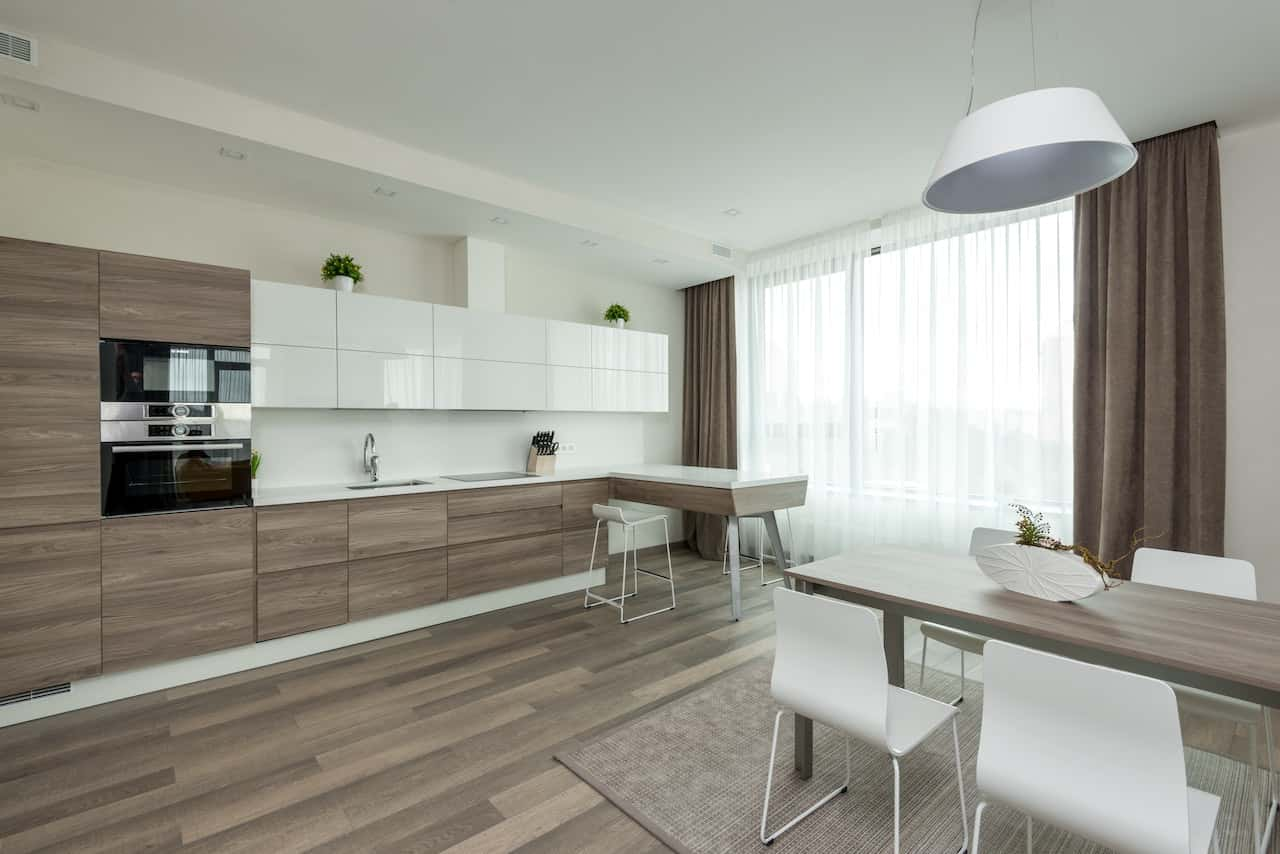The floor is the largest canvas a home provides. Picking the most suitable flooring option depends upon several factors, including your style, the house or room’s general theme, design preferences, and budget.

Linoleum is a popular natural flooring option that is environment-friendly, resilient and durable, obtained from natural sources, and considered a renewable and biodegradable option. It is available as linoleum flooring rolls that can be spread as sheets, modular, and click-together tiles.
While looking up what is Sheesham flooring, are tiled floors better or should you go old-school with linoleum, let’s dive deep into the pros and cons of linoleum flooring!
While you take your pick, let’s get you attuned to the various pros and cons of linoleum flooring!

When linoleum flooring is maintained well, it shows excellent resistance to wear and tear. With proper care, linoleum flooring can last for upto 40 years.
Though most people think of linoleum as the flooring of the yesteryears, it has gained popularity due to its superior durability at an affordable rate. Durability is one of the most discussed pros and cons of linoleum flooring.
Learning more about the pros and cons of linoleum flooring is incomplete without understanding the relationship linoleum has with water. Linoleum sheet flooring is water-resistant, which makes it ideal for kitchen and bathroom floors. All you need to do is use a wet cloth to mop it.
Besides its natural make, linoleum flooring is affordable and cost-effective compared to many other popular options.
Since linoleum flooring is made from naturally-available materials pieced together, it is far more affordable than other flooring types. The low price point also makes linoleum a popular flooring choice.
Among the pros and cons of linoleum flooring is that linoleum does not emit volatile organic compounds (VOCs) that may have health effects. This makes it a safe flooring option for your home.
Linoleum is also an environment-friendly flooring made from renewable, natural materials. Linoleum also has anti-skid properties, making it a safe flooring option.
Linoleum may be tough and resilient but provides a soft, warm, bouncy feel under the foot. This flooring also offers you warmth and comfort equivalent to a carpet, which is why people prefer to use them in living rooms, bedrooms and outside their kitchens or bathrooms.
It is important to know and understand the pros and cons of linoleum flooring to determine if it is the flooring option you are looking for! Here are some cons of linoleum flooring:
Though resilient and durable, linoleum is still susceptible to tears and dents, especially when furniture is dragged on or you use heels to walk on it.

Though linoleum flooring installation is easy, it is not for DIYers. Professional installation of linoleum can be expensive. If you want your linoleum flooring to last a lifetime, it is recommended to self-install it.
When linoleum flooring is not maintained properly or is frequently exposed to direct sunlight, it starts turning yellow due to the oxidation of linseed oil. Though many manufacturers add a protective coating to prevent the yellowing of linoleum, it is not a standard practice. So, you must ensure you pick the right brand of linoleum.
Yes, linoleum is water-resistant but is susceptible to standing water, which can cause permanent damage to it. So, linoleum floorings cannot be used where it is likely to come in contact with moisture frequently. Water resistance and its effect are often considered when evaluating the pros and cons of linoleum flooring.
Using linoleum for the flooring in your house is a personal choice often. Understanding the pros and cons of linoleum flooring can help determine if it is the right flooring for your home. With the right maintenance and care, linoleum flooring can be long-lasting.
If you wish to know more about the best flooring options for your home, what is a laminate, the most popular interior design ideas and the pros and cons of linoleum and other flooring options, find it here on HomeLane!
Though a great flooring option, there are many pros and cons of linoleum flooring. A few of its disadvantages include:
Linoleum is a great option for flooring as it is durable if maintained properly. A few reasons why linoleum flooring is recommended include:
It is common for people to get confused between vinyl and linoleum flooring. While both are great options, picking one that suits your flooring needs is important. If you are looking at durability, versatility in design, cost-effectiveness and eco-friendly nature, linoleum should be your pick.
Suppose easy installation and maintenance, large design options and waterproof properties are attractive to you at the cost of durability, effect on the environment and risk of wearing out. In that case, vinyl may be a good option.

 EXPLORE MORE
EXPLORE MOREExplore This Vibrant Bangalore Home That Revels in the Interplay of Patterns and Textures!
This Stunning Chennai Home Channels Nuanced Character and Tonality
Step Into This Minimal Chennai Home, and Get Wrapped in Comfort!
This Compact Chennai Apartment Is an Ode to Smart Design and Functionality!
 EXPLORE MORE
EXPLORE MOREExplore This Vibrant Bangalore Home That Revels in the Interplay of Patterns and Textures!
This Stunning Chennai Home Channels Nuanced Character and Tonality
Step Into This Minimal Chennai Home, and Get Wrapped in Comfort!
This Compact Chennai Apartment Is an Ode to Smart Design and Functionality!
By submitting this form, you agree to the privacy policy and terms of use